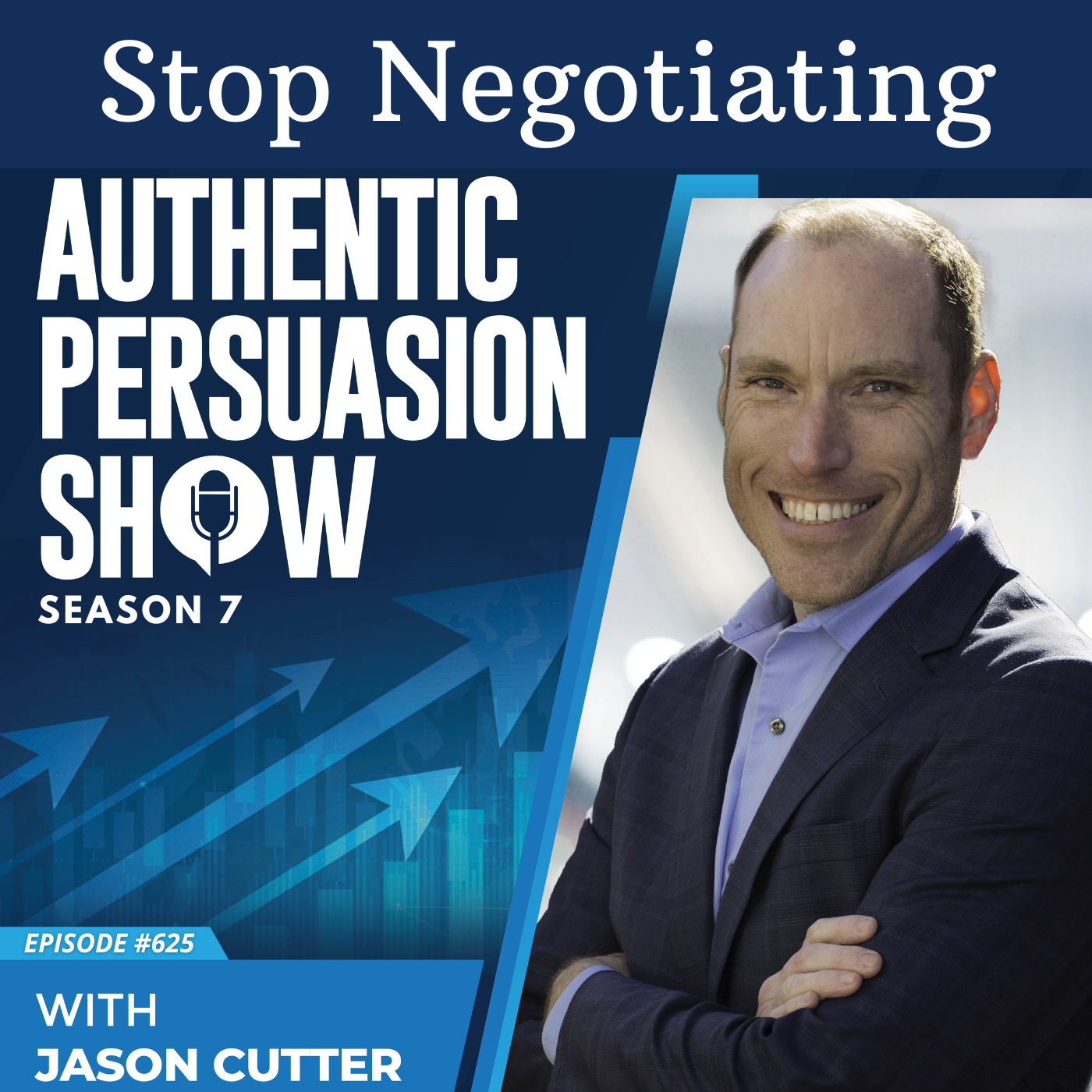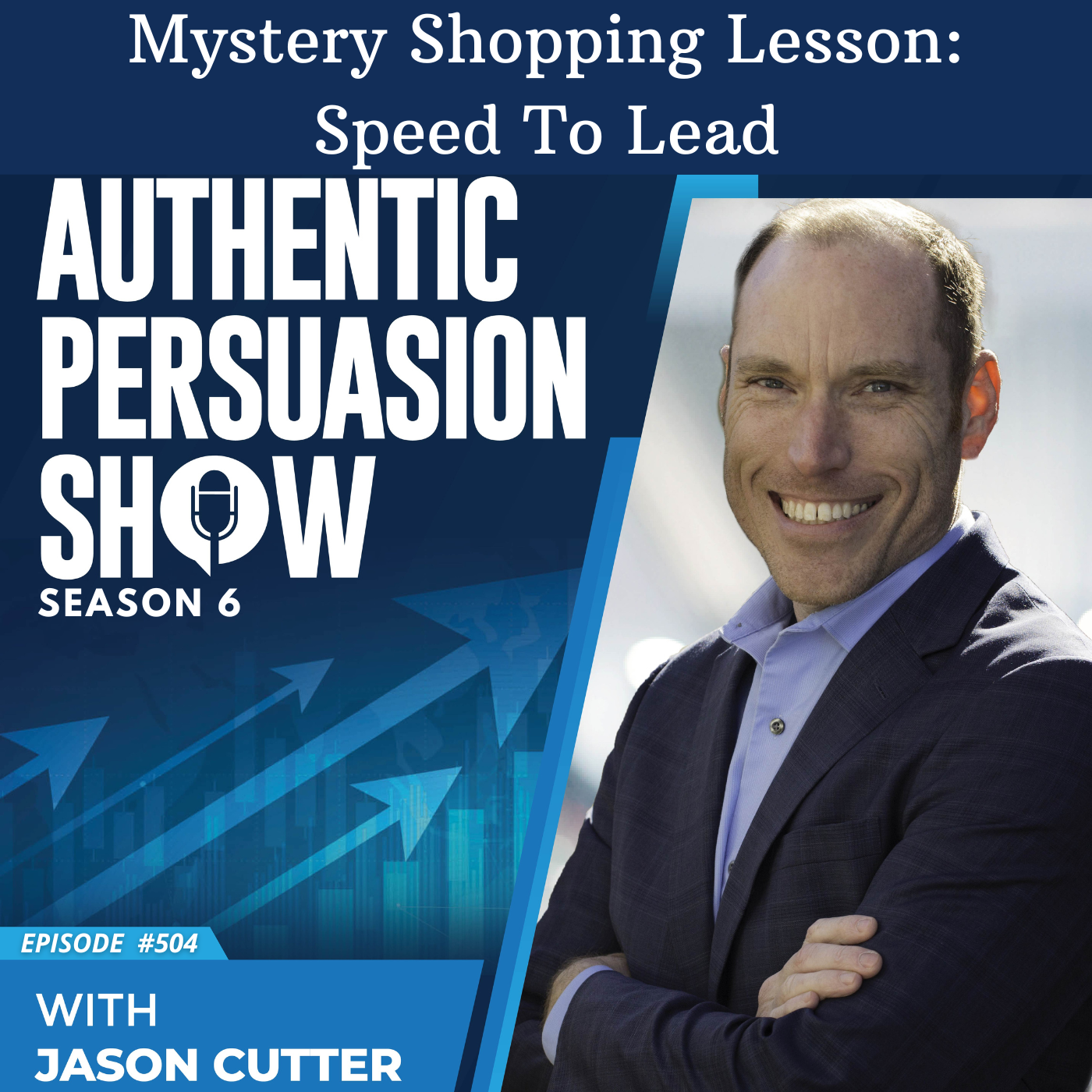Episode Transcript
Jason [00:00:00]:
You. This is the authentic persuasion show. Hey there, and welcome to episode 595 of the Authentic Persuasion show. My name is Jason. Welcome to the podcast, and hopefully your year is going well. We're basically halfway through 2023. It's been quite the interesting year in terms of sales, business economy, inflation, job loss, work from home versus required to work in the office, consolidations, AI technology fears about the robots taking over jobs, especially in sales, in any role. Yet here we are.
Jason [00:00:42]:
It's June 26, 2023, and what I want to talk about is kind of the combination of all of those things leading into what matters most. If we truly look at the role of a salesperson, someone in sales, no matter what you're selling, could be retail furniture in person, in a showroom. It could be SDR BDR appointment setting, business to business, business to consumer, cold outreach. It could be SaaS demos through an account executive. You could be an enterprise account executive or salesperson. It doesn't matter. One of the things, when we look at all of these factors, the inflation, the job loss, the job creation, AI technology, job replacement fears, all of that, really what it comes down to is one thing. Your role in sales is to have interactions with other humans.
Jason [00:01:48]:
If we look at the role of technology and where that fits in as a tool, the tools, when used successfully by sales teams and by individuals, is to help facilitate scalability of getting in front of the right people. And recently I was talking to someone on the podcast as a guest, and he was talking about how the buyers out there, especially the professional buyers, in a b to b sense, they have similar technology tools to block you from getting to them, right, to keep you at bay and kind of shield themselves away from you, the salesperson. And obviously, there's reasons for that, because there's so many people out there in sales who are just doing whatever they want and hammering on people and playing the gross terrible numbers game at scale and just making it hard for everyone else to be effective as a sales professional. Again, sales is not a profession. There's no regulation, there's no governing body. There's no oath, there's no circumstances, consequences for somebody who breaks the rules because there are no rules. And so we're left with this industry that makes it really challenging to be successful in because everyone has their guard up and they're against you, and they don't want to talk to you until they realize that they do want to talk to you. And so your role, your job, your one task is to get to people so that you can have a conversation and that's the biggest thing when we talk about AI replacing jobs.
Jason [00:03:15]:
If what you sell can be replaced by a chat bot or AI or online systems for helping someone sign up to buy from you, then most likely you're selling something that's pretty much a commodity. You may think it's special, you may think you're unique, you may think your company thinks that it's unique and special and that everyone wants it and wants to talk to you. But if it's so easy, someone can order it online or do it through some AI, whether it's a chat bot or it's an sms like AI tool, then what you're selling is a commodity. Because then somebody's making a decision of do I want this or do I not want this? And they can make that on their own. If they can make that decision on their own, then you're purely an order taker in that situation. And if that's the case, then you're most likely at risk of losing your job to technology, to AI. If we think of like say bookstores, where it used to be, the only way you could get a book was to go in a bookstore, then online, then Amazon happened and it just totally turned that upside down. If what you're selling, let's say like books, can just be bought online, then what's the point of people coming in now? Some people want experience, some people still want help.
Jason [00:04:33]:
Some people like the feeling of buying or shopping. However, most of the time, especially professional buyers, somebody who's at a company who is looking to buy something and they buy things regularly, they don't need the experience. They're not excited about going to the bookstore or walking up and down Ikea because they love that feeling on a Saturday. That's not what they're into for the sales experience of dealing with you. If they can make a decision online, they're going to do it. They're going to save time, they're going to save effort and save the potential hassle of dealing with you. And it's just the way it goes. And if you argue that or you don't think that's true, or you think that I'm wrong, you might want to take an assessment of the sales environment and the buying environment, what buyers truly want, and I talk a lot about it on this podcast and the training I do for companies and what I teach salespeople that really they don't care about you, they only care about yourself.
Jason [00:05:29]:
The unfortunate challenge is most salespeople only care about themselves and think about themselves and think everyone else wants what they have, and you've got to separate that. You've got to split that out. This goes back to what I was talking about where if AI and technology can replace what you're selling and replace you as a salesperson, then you're selling a commodity that has an easy decision flow. Should I buy this or not? What are my options? Can I pick what I want or not? And that's it, right? Very simple, like cars. If I know what I want for a car and then now I just want to pick the options, why do I need to go to a dealership? Why don't I just order this car online, even brand new. Why don't I just order the car online, brand new, pick all the specs, and then you let me know when it's ready and then I'll pay for it and then pick it up. And so if that's you, obviously there's a challenge that you're going to be faced with. Most of the people, if you're listening to this, it's probably not you.
Jason [00:06:23]:
Like, I have a client who is higher end, custom made furniture, like you can order. I have ordered furniture on Amazon and had it delivered somewhat because I don't have a truck. I'm not a truck guy. And so going and getting furniture and then bringing it home is not a thing. Getting something and then having it delivered is the only other option. Or order it online and then it shows up and then it's just right there when I want it. Now in the retail furniture space, if I want something custom or somebody wants something unique and special and someone has a special need or a desire, then you want to go deal with a company and a professional who's going to help beyond just taking the order, right? Like this isn't an order taking sale. And so for that, here's your biggest thing.
Jason [00:07:12]:
The biggest thing to remember is that you are a human, and the other human you're talking to is looking for help. They're looking for guidance, and if they're willing to talk to you or they've raised their hand trying to find somebody to talk to, like if you've ever gone into a retail store, whether it's clothes or furniture or cars or anything like that, especially anything significant, where it's a significant considered purchase and you've walked into the store and you literally cannot find an adult to help you, you know, kind of what you want. You have money available. Like you have the funds, you have the desire to buy it. You have a need for something let's say furniture, and you just want to find some help. Have you ever had that experience so frustrating, where you walk into the store and you can't find anybody, everyone on a smoke break. Is everyone hiding? Is everyone helping other customers? And you walk around for a few minutes, you still can't find anybody. I've done that where I'm like, I'm out of here.
Jason [00:08:12]:
I literally turn around. I would rather go to another store where somebody's attentive because it's my money. I can do whatever I want with it. Unless I need you so bad. You're the only game in town. I'm going to go somewhere else. And so if somebody is raising their hand, walking into your store, filling out your form online, like showing up for a conversation, a demo, walking through a conference trade show floor, walking to your booth, and then asking questions or even making eye contact, they're saying, hey, I want to interact with you because I might have a need, and I think you might be able to help me. That means your job is in that moment.
Jason [00:08:50]:
Everything you do is for that moment. A lot of times, people in sales think, oh, well, it's about this, like, prep, and I've got to do this outreach, and I've got to do this message, and I've got to send this, and I got to do that, and I got to build this slide deck and build, like, no, those are all extra items for preparing for the moment or getting you in front of the big moment, which is you interacting with another human. That is your only job. Not email cadences, not LinkedIn messages, not anything else that you think is your job. Your job is to interact with other humans. Now, why do I say that? Because those other things are important business development tasks or roles you got to do. You've got to follow up with people. You've got to maintain your CRM.
Jason [00:09:36]:
You've got to make sure you manage your pipeline. All of that is important. That'd be like saying the only thing that matters for a professional athlete is to just show up and play the game. Like, no, there's so much prep, and the game is such a small portion of a professional athlete's life, right? Like, depending on the sport, it could literally represent five, maybe 10% of their life. It's usually like 5% if you think about american football or even, let's say, international football, soccer, where they play once a week, you play once a week, and it's two, 3 hours of being present in the game, 40 to 60 to 90 minutes of game time. Depending on the sport, once a week, which means that represents basically nothing. That's all we see. That's what we see is that person in the arena doing what they do.
Jason [00:10:27]:
But that only represents a small portion. Right. The rest of it is prep and being ready for that moment. You have to look at it the same way. The moment you are talking with another human. That's your biggest value, that's your greatest opportunity in sales. While persuading and helping someone get to a better place is truly in that moment with other humans. That's it, right? That's the one thing that AI can't replace, is helping a human who is scared, who's confused, who has issues, who has hopes, have dreams, have baggage, have previous bad experience, have pressure, whether it's personal or business, and they don't know what to do, and they're looking for help, and they want wisdom and guidance, they have access to information.
Jason [00:11:12]:
But what they need is somebody who is empathetic, ask questions, and diagnose their situation where they want to go, and then give them the right prescription. Just like a doctor, right? Like you can go online and try to diagnose yourself. It's not going to do any good because you don't know that that is exactly what's wrong. Versus going to a professional. Like a doctor who has gone through a lot of schooling, has taken tests, has proven that they're trustworthy in giving diagnosis, and held accountable if they screw up. Right. That's what malpractice insurance and malpractice lawsuits are all about. It could potentially lose their license if they screw up.
Jason [00:11:51]:
So it puts the pressure on them to give you an accurate prescription based on an accurate diagnosis. And that's their process, and that's what you want to do in sales. And so remember that the point of this episode, the biggest thing I can relay is that I want you to remember your job is to deal with the humans. Just focus on those human interactions and put everything you can into that conversation that you have with another person, whether it's an intro call, or it's a cold semicold outreach, as an SDR, a BDR, or a telemarketer. And you're looking for someone who's willing to answer and then willing to accept an invite to have a meeting with the next level salesperson. Or if you're the salesperson, you're the closer, you're the consultative person where you want to focus on that person. That's all that matters. And your sales process and the sales experience should be built around that.
Jason [00:12:48]:
That's how you insulate yourself. That's how you keep yourself from being replaced by the robots. At least until the very last moment where they take over everything like you see in the movies. And everyone's forced to go underground, whether it's Terminator or the Matrix. Until that moment. Remember, your job is to focus on the humans and helping them get to a better place.
![[595] The One Job You Have That AI Can't Replace](https://episodes.castos.com/salesexperiencepodcast/images/1501725/The-one-job-you-have-that-AI-can-t-replace.png)


